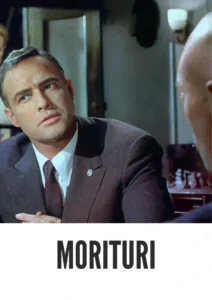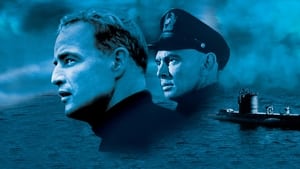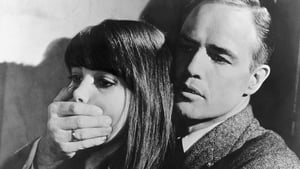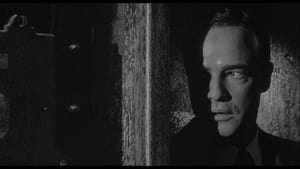Contact: info@alwanfilm.com
Video Sources 0 Views

Synopsis
Review: Morituri 1965 Colorized – Unveiling the Intricacies of War and Betrayal

Introduction
“Morituri 1965,” directed by the acclaimed German filmmaker Bernhard Wicki, is a gripping wartime thriller that explores the depths of human courage, betrayal, and survival. Set against the backdrop of World War II, the film combines suspenseful narrative with complex character development, creating a poignant reflection on the harsh realities of war. The film’s recent re-release in an enhanced format has reignited interest in its cinematic craftsmanship and thematic richness. This article delves into the film’s intricate layers, examining its impact, significance, and the controversy surrounding its presentation.
Check The Full Colorized Movies List
Check Our Colorized Movies Trailer Channel
Understanding Morituri 1965 Colorized: Director, Cast, and Genre
“Morituri 1965” marks a significant entry in Bernhard Wicki’s directorial career, showcasing his adeptness at weaving tense, character-driven narratives. Wicki, known for his evocative storytelling and deep psychological insights, brings a unique vision to this World War II thriller. The film stars Marlon Brando, who delivers a compelling performance as the central character, Robert Crain, a German deserter and anti-Nazi sympathizer. The cast also includes Yul Brynner, who plays the formidable antagonist, Colonel Von Raden, and Janet Margolin, who portrays the intriguing and complex love interest, Anna.
The film falls within the genre of wartime thriller, blending elements of espionage, suspense, and moral conflict. It explores themes of loyalty, betrayal, and the personal cost of war, making it a multifaceted piece that resonates on both emotional and intellectual levels.
Exploring the World of Morituri 1965 Colorized: Plot and Characters
“Morituri 1965” unfolds with the story of Robert Crain, a former German naval officer who is coerced into a dangerous mission to sabotage a Nazi ship. Crain’s complex motivations are driven by his desire to escape the guilt of his past actions and make amends for his previous allegiances. The narrative tension heightens as Crain navigates a web of deception, personal sacrifice, and moral ambiguity.
The plot intricately weaves together Crain’s internal struggles with external threats, as he faces off against Colonel Von Raden and his loyal crew. The film’s richly developed characters, including the enigmatic Anna, add depth to the story, illustrating the personal stakes involved in wartime decisions. The interplay between Crain and Von Raden highlights the film’s exploration of power dynamics and the ethics of resistance.
The Art of Wartime Thrillers
Wartime thrillers like “Morituri 1965” offer a unique lens through which to explore the complexities of war. These films often juxtapose high-stakes action with deep psychological and moral dilemmas, creating a compelling blend of suspense and introspection. The genre excels at capturing the chaos and uncertainty of conflict, while also delving into the human dimensions of courage, betrayal, and redemption.
The art of crafting a successful wartime thriller lies in balancing gripping action sequences with nuanced character development. Filmmakers must navigate the delicate terrain between thrilling escapades and profound emotional depth, ensuring that the narrative remains both engaging and thought-provoking.
Early Wartime Cinema: A Brief History
The genre of wartime cinema has evolved significantly over the decades, reflecting changing attitudes towards conflict and heroism. Early wartime films often focused on patriotic themes and heroic deeds, while later entries, like “Morituri 1965,” began to explore more nuanced perspectives on war, including themes of dissent, betrayal, and moral ambiguity.
From the early days of cinema, filmmakers have used the backdrop of war to examine the human condition, producing works that range from glorifying valor to critiquing the futility of conflict. The evolution of wartime cinema reflects broader societal changes and ongoing debates about the nature of heroism and the costs of war.
Morituri 1965 and Its Enhanced Presentation
The recent re-release of “Morituri 1965” in an enhanced format has introduced the film to a new generation of viewers, highlighting its enduring relevance and cinematic quality. The updated presentation allows for a fresh appreciation of Wicki’s directorial vision and the film’s intricate production design.
The enhanced format underscores the film’s rich visual and thematic elements, offering a renewed perspective on its portrayal of wartime tension and psychological complexity. For both new and returning audiences, this re-release serves as a testament to the film’s lasting impact and the craftsmanship of its creators.
The Debate Over Film Enhancements
The enhancement of classic films, including re-releases in updated formats, often sparks debate within the film community. While some argue that such enhancements breathe new life into older works, others contend that they risk altering the original artistic intent and historical context.
The controversy surrounding film enhancements reflects broader discussions about the preservation of cinematic heritage and the balance between innovation and tradition. As technology continues to advance, filmmakers and audiences grapple with the implications of updating classic films while striving to honor their original essence.
Examining Morituri 1965 as an Enhanced Film
Viewing “Morituri 1965” in its enhanced format provides an opportunity to revisit its narrative and visual elements with a fresh perspective. The updated presentation accentuates the film’s dramatic tension, character interactions, and thematic depth, offering a renewed appreciation of its artistic achievements.
For some viewers, the enhanced format may enrich their understanding of the film’s historical and emotional context, while others may prefer the original presentation for its authenticity. Ultimately, the enhanced version highlights the film’s enduring relevance and the continued fascination with its complex portrayal of wartime drama.
Influence and Legacy: Morituri 1965 Colorized’s Impact on Cinema
“Morituri 1965” has left a lasting impact on the genre of wartime thrillers, influencing subsequent films with its nuanced portrayal of conflict and moral ambiguity. The film’s exploration of resistance and betrayal, combined with its powerful performances, has cemented its place as a significant work within the genre.
The legacy of “Morituri 1965” extends beyond its immediate impact, shaping the evolution of wartime cinema and inspiring filmmakers to explore the complex interplay between heroism and morality. The film’s enduring relevance reflects its contribution to the ongoing discourse on the human dimensions of conflict.
Director’s Cinematic Legacy: Beyond Morituri 1965 Colorized
Bernhard Wicki’s directorial legacy encompasses a diverse body of work that extends beyond “Morituri 1965.” Known for his ability to tackle complex themes with sensitivity and insight, Wicki’s films often delve into psychological and existential questions, reflecting his profound understanding of the human condition.
Wicki’s contributions to cinema include works that explore social issues, personal dilemmas, and the intricacies of human relationships. His directorial style, marked by a keen sense of psychological depth and moral nuance, has left an indelible mark on the world of film, influencing both contemporary and future filmmakers.
Themes Explored in Morituri 1965 Colorized
“Morituri 1965” delves into themes of courage, betrayal, and the personal cost of war, offering a complex portrayal of wartime ethics and human motivations. The film’s exploration of resistance against oppressive regimes and the moral dilemmas faced by its characters resonates with audiences on both emotional and intellectual levels.
The central theme of betrayal is poignantly illustrated through Crain’s conflicted loyalty and the dangerous mission he undertakes. The film’s examination of courage in the face of adversity and the personal sacrifices required for redemption highlights the complexities of wartime choices and the moral gray areas that define human behavior.
Reception and Controversy Surrounding Morituri 1965 Colorized
The reception of “Morituri 1965” has been characterized by a mix of acclaim and controversy, reflecting the film’s impact on both critics and audiences. While many praise its powerful performances and intricate narrative, others have debated the film’s portrayal of war and its thematic implications.
The controversy surrounding “Morituri 1965” often centers on its depiction of wartime ethics and the moral choices faced by its characters. Critics and viewers alike continue to engage in discussions about the film’s representation of courage, betrayal, and the complexities of human behavior in times of conflict.
Where to Watch Morituri 1965 Colorized Online
For those interested in experiencing “Morituri 1965,” the film is available on various streaming platforms, offering accessibility to both new and returning viewers. The updated presentation allows audiences to engage with the film’s narrative and visual elements in a renewed context, highlighting its enduring significance and cinematic excellence.
FAQs About Morituri 1965 Colorized
Common queries about “Morituri 1965” often revolve around its historical accuracy, thematic elements, and the impact of its enhanced presentation. Addressing these frequently asked questions can provide viewers with a deeper understanding of the film’s context and significance.
Q: Is “Morituri 1965” based on real events?
A: While “Morituri 1965” is not a direct historical account, it draws on themes of wartime resistance and betrayal that resonate with real historical contexts. The film’s narrative explores the broader implications of wartime ethics and personal sacrifice.
Q: What are the key themes of “Morituri 1965”?
A: The film explores themes of courage, betrayal, and the personal cost of war. It examines the moral dilemmas faced by its characters and the complexities of resistance against oppressive regimes.
Q: How does the enhanced format affect the viewing experience?
A: The enhanced format provides a renewed appreciation of the film’s visual and thematic elements, accentuating its dramatic tension and character interactions. While some may prefer the original presentation for its authenticity, the enhanced version highlights the film’s enduring relevance.
Conclusion
In conclusion, “Morituri 1965” stands as a significant work in the genre of wartime thrillers, offering a profound exploration of courage, betrayal, and the human cost of nuanced character development. The tension between personal and political motivations often drives the narrative, creating a sense of urgency and emotional weight that resonates with audiences.
Early Wartime Films: A Brief History
The genre of wartime films has evolved significantly since its inception, reflecting changes in historical perspective, technological advancements, and shifts in audience expectations. Early wartime films, often produced during or shortly after World War II, were characterized by a focus on patriotism, heroism, and the triumph of good over evil.
As cinema progressed, wartime films began to explore more complex and nuanced portrayals of conflict. The emphasis shifted from simple narratives of valor to more intricate examinations of moral ambiguity, psychological trauma, and the impact of war on individuals and societies. “Morituri 1965” represents a critical point in this evolution, reflecting a growing interest in exploring the darker and more ambiguous aspects of war.
Morituri 1965 and Its Enhanced Presentation
The recent re-release of “Morituri 1965” in an enhanced format has sparked renewed interest in the film’s cinematic merits. This updated presentation brings new clarity to the film’s visual and auditory elements, enhancing the viewing experience and offering a fresh perspective on Wicki’s directorial vision.
The enhanced format highlights the film’s meticulous craftsmanship, from the intricacies of its set design and cinematography to the subtle nuances of its performances. The improved quality allows viewers to fully appreciate the film’s atmospheric tension and the skillful interplay between light and shadow, which are central to its dramatic impact.
The Debate Over Film Enhancements
The practice of enhancing classic films, whether through colorization, remastering, or digital restoration, often sparks debates within the film community. While some argue that such enhancements bring valuable improvements to the viewing experience, others contend that they risk altering the original artistic intent and historical context of the film.
The debate over film enhancements reflects broader concerns about the preservation of cinematic heritage and the impact of technological advancements on artistic integrity. While enhancements can offer new insights into classic films, they also raise questions about the balance between innovation and fidelity to the original work.
Examining Morituri 1965 as an Enhanced Film
Viewing “Morituri 1965” in its enhanced format provides a fresh perspective on Wicki’s film, revealing previously obscured details and adding depth to its visual and auditory elements. The enhanced presentation allows audiences to fully immerse themselves in the film’s atmospheric tension and appreciate the meticulous craftsmanship behind its production.
However, the enhancement also raises questions about the balance between modernization and preservation. While the updated format offers a clearer and more vibrant viewing experience, it is essential to consider how these changes impact the film’s original artistic vision and historical context.
Influence and Legacy: Morituri 1965’s Impact on Cinema
“Morituri 1965” has left a lasting impact on the genre of wartime thrillers, influencing subsequent films and filmmakers with its nuanced portrayal of conflict and morality. The film’s exploration of themes such as betrayal, personal sacrifice, and the cost of war has resonated with audiences and critics alike, contributing to its enduring legacy.
The film’s influence extends beyond its immediate genre, reflecting broader trends in cinematic storytelling and character development. Its complex narrative structure and psychological depth have inspired filmmakers to explore similar themes in their own work, highlighting the film’s significance within the broader context of cinematic history.
Director’s Cinematic Legacy: Beyond Morituri 1965
Bernhard Wicki’s cinematic legacy extends beyond “Morituri 1965,” encompassing a diverse body of work that spans multiple genres and themes. Wicki’s contributions to film are marked by his innovative storytelling techniques, deep psychological insights, and commitment to exploring complex human experiences.
From his early works to his later films, Wicki’s career reflects a dedication to examining the human condition and the impact of historical events on individual lives. His films continue to resonate with audiences and critics, cementing his status as a significant figure in the world of cinema.
Themes Explored in Morituri 1965
“Morituri 1965” delves into themes of war, betrayal, and personal sacrifice, offering a poignant reflection on the human cost of conflict. The film’s exploration of these themes is underscored by its rich character development and moral ambiguity, creating a narrative that is both compelling and thought-provoking.
The central theme of betrayal is vividly portrayed through the character of Robert Crain, whose internal conflicts and external actions highlight the complexities of loyalty and deception. The film also examines the impact of war on individuals, illustrating the personal struggles and moral dilemmas faced by those caught in the crossfire.
Reception and Controversy Surrounding Morituri 1965
The reception of “Morituri 1965” has been marked by both acclaim and controversy. Critics have praised the film for its gripping narrative, complex characters, and thematic depth, highlighting its contributions to the genre of wartime thrillers. However, the recent enhancement of the film has sparked debates about the impact of such changes on the original artistic vision and historical context.
The controversy surrounding the film’s enhancement reflects broader discussions about the balance between modernization and preservation in cinema. While some view the updated format as a valuable improvement, others argue that it risks altering the film’s original aesthetic and thematic resonance.
Where to Watch Morituri 1965 Online
For those interested in experiencing “Morituri 1965,” the film is available on various streaming platforms and through digital rental services. The enhanced format offers a fresh perspective on Wicki’s work, allowing viewers to fully appreciate its cinematic craftsmanship and thematic richness.
FAQs About Morituri 1965
Q: Is “Morituri 1965” based on real events?
A: While “Morituri 1965” is not based on specific historical events, it draws on the broader context of World War II to create a fictional narrative that explores themes of war, betrayal, and personal sacrifice.
Q: How does the film’s enhanced format affect its viewing experience?
A: The enhanced format of “Morituri 1965” offers improved visual and auditory clarity, allowing viewers to appreciate the film’s craftsmanship and atmosphere. However, it also raises questions about the impact of such changes on the film’s original artistic vision.
Q: What are the key themes explored in the film?
A: The film explores themes of war, betrayal, and personal sacrifice, highlighting the moral and psychological complexities faced by its characters. It offers a poignant reflection on the human cost of conflict and the challenges of navigating loyalty and deception.
Conclusion
“Morituri 1965” stands as a significant achievement in the genre of wartime thrillers, its impact enduring through its nuanced portrayal of conflict and morality. While the enhanced format provides a fresh perspective on Wicki’s film, it also raises important questions about the balance between modernization and preservation. Regardless of the format, the film’s exploration of themes such as betrayal, personal sacrifice, and the human cost of war remains a powerful testament to its cinematic significance. As we continue to navigate the evolving landscape of film presentation and preservation, “Morituri 1965” serves as a reminder of the enduring power of storytelling to illuminate the complexities of the human experience.














